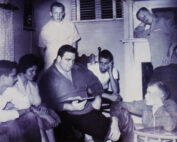What does it mean to leave a legacy? Have you ever thought about the world you will leave behind, or the effect your life will have upon it? Great or small, good or bad, each of us will change the world to some degree.
In his poem Ozymandias, Percy Bysshe Shelley describes what was once an imposing, colossal statue that towered above the inhabitants of a forgotten city. Now, the surrounding structures have eroded away, leaving only the sculpture itself. Though now a shattered ruin, the inscription on the pedestal can still be read – “My name is Ozymandias, king of kings: Look on my works, ye Mighty, and despair! Surrounded only by “lone and level sands the statue is a mere shadow of its former glory, yet still declares the might of the long-dead king to a barren desert.
It reads like a cautionary legend, but Ozymandias was no fictional character. “Ozymandias was the Greek name for Ramses the Great, considered by many to be the greatest and most powerful Pharaoh in Egyptian history. Ruling for 66 years, he won numerous military victories and expanded Egyptian wealth and influence to unprecedented levels. His people considered him to be a god, and nine subsequent pharaohs took the name Ramses in his honor. In his day he was without equal, heavily influencing the future development of 3 continents.
Ramses was a great man by historical standards, but what is the eternal value of his deeds? Consider Christ’s words in his Sermon on the Mount:
“Do not store up for yourselves treasures on earth, where moths and vermin destroy, and where thieves break in and steal. But store up for yourselves treasures in heaven, where moths and vermin do not destroy, and where thieves do not break in and steal. For where your treasure is, there your heart will be also. – Matthew 6:19-21
We each “store up some form of “treasure daily. For some that means investing in savings accounts, property, retirement accounts, or other financially profitable means. For others that may be in experience, knowledge, or skill. These are good things to pursue, but the truly wise don’t invest exclusively in the things of this world.
Like most pharaohs, Ramses was buried with a great deal of wealth, but it was quickly stolen by thieves exactly as Jesus described. Even if it hadn’t, it wouldn’t do him any good. The glory of Ramses has faded, he has no further power or influence, and the empire he ruled is no more.
So what kind of legacy will you leave? Like Ramses, you can invest in earthly treasure, but over time your legacy will begin to decay. However, if you invest your life in others, and pour yourself into serving God and His kingdom, your legacy will last forever. How do you do this? The basic instructions are simple (but not necessarily easy to carry out). Invest your life in others; share the Gospel, be active in your local church, give generously to those in need, and teach others to do the same. You may not go down in history, but the priceless legacy you leave will last forever, and the glory of Ramses will pale by comparison.
Stay Updated
Sign up for our monthly newsletter and weekly devotional











